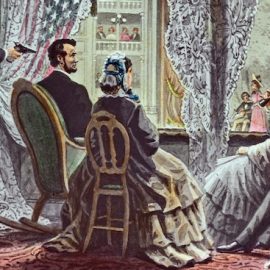
What did J. Robert Oppenheimer discuss with Haakon Chevalier? Why did Oppenheimer lie to the FBI about it?
When J. Robert Oppenheimer was fighting to keep his security clearance after World War II, the Chevalier incident threatened to sink his efforts—and his career. Biographers Kai Bird and Martin Sherwin explain the affair in their 2006 book American Prometheus.
Continue reading to learn about the intriguing Chevalier incident.
The Chevalier Incident
After World War II, Oppenheimer was often targeted by his political enemies for his past connections to communism. According to Bird and Sherwin, the animosity toward him culminated in December 1953, when he learned that the Atomic Energy Commission (AEC) intended to revoke his security clearance. The Eisenhower administration decided to conduct a hearing.
Bird and Sherwin contend that, in addition to underhanded tricks, the prosecution relied heavily on Oppenheimer’s testimony about the “Chevalier incident,” a conversation between Oppenheimer and Haakon Chevalier, his close friend and fellow Berkeley faculty member, in late 1942.
Months later, in August 1943, Oppenheimer first gave an account of this conversation to Colonel Boris Pash. Oppenheimer told Pash that he and two other scientists had been approached by an intermediary (later revealed as Chevalier) who was friends with George Eltenton, a physicist with connections to the Soviet Union. Per Oppenheimer’s testimony, this intermediary told Oppenheimer and the other scientists that Eltenton hoped to relay information about the Manhattan Project to the Soviets, a suggestion Oppenheimer immediately called treasonous.
(Shortform note: According to historian Vincent C. Jones, although Pash was shocked that Oppenheimer had waited so long to disclose the conversation with Chevalier, he nonetheless believed that Oppenheimer was loyal to the US. For this reason, Pash recommended that Oppenheimer continue directing the Manhattan Project with the caveat that Oppenheimer be monitored by US intelligence agents.)
Later, in June 1946, FBI agents simultaneously interviewed Eltenton and Chevalier about Chevalier’s discussion with Oppenheimer in 1943, giving them no time to coordinate their answers. They both corroborated Oppenheimer’s previous account, with one glaring exception: They both denied having approached two other scientists, as Oppenheimer claimed. Later, in September 1946, FBI agents interviewed Oppenheimer himself, who admitted to fabricating elements of his original account to protect Chevalier’s identity.
(Shortform note: Though Oppenheimer allegedly attempted to protect Chevalier, Chevalier later became a victim of the US anti-communist movement nonetheless; Chevalier lost his job at Berkeley in 1950 because of his communist sympathies, and he would ultimately leave the US to live in France until his death in 1985.)
Bird and Sherwin point out that, in the 1954 hearing, Oppenheimer’s prior false testimony proved damning. Robb compelled Oppenheimer to admit to the AEC’s panel that he had lied to the FBI and waited eight months to disclose a conversation of crucial security information. Moreover, in the heat of the examination, Robb induced Oppenheimer to call himself “an idiot” who told “a whole fabrication and tissue of lies.” This testimony, Bird and Sherwin argue, greatly discredited Oppenheimer in the eyes of the panel.
(Shortform note: According to Harold Green, the AEC’s legal adviser during the hearing, Robb’s cross-examination represented a key shift in the nature of AEC security hearings. He alleges that, prior to the Oppenheimer hearing, AEC hearings functioned largely to clear individuals accused of being a security risk. Robb’s harsh cross-examinations and entrapment tactics, however, showed that this hearing sought instead to prosecute and humiliate its defendant.)
In May 1954, the panel voted two to one to revoke Oppenheimer’s security clearance, deeming Oppenheimer a security risk (though affirming his loyalty to the US). The next month, AEC commissioners ratified the decision in a four-to-one vote.

———End of Preview———
Like what you just read? Read the rest of the world's best book summary and analysis of Kai Bird and Martin Sherwin's "American Prometheus" at Shortform.
Here's what you'll find in our full American Prometheus summary:
- The biography of J. Robert Oppenheimer that inspired the movie Oppenheimer
- Oppenheimer's early life and mental health struggles
- Oppenheimer's role in developing the atomic bomb and the following hearing






